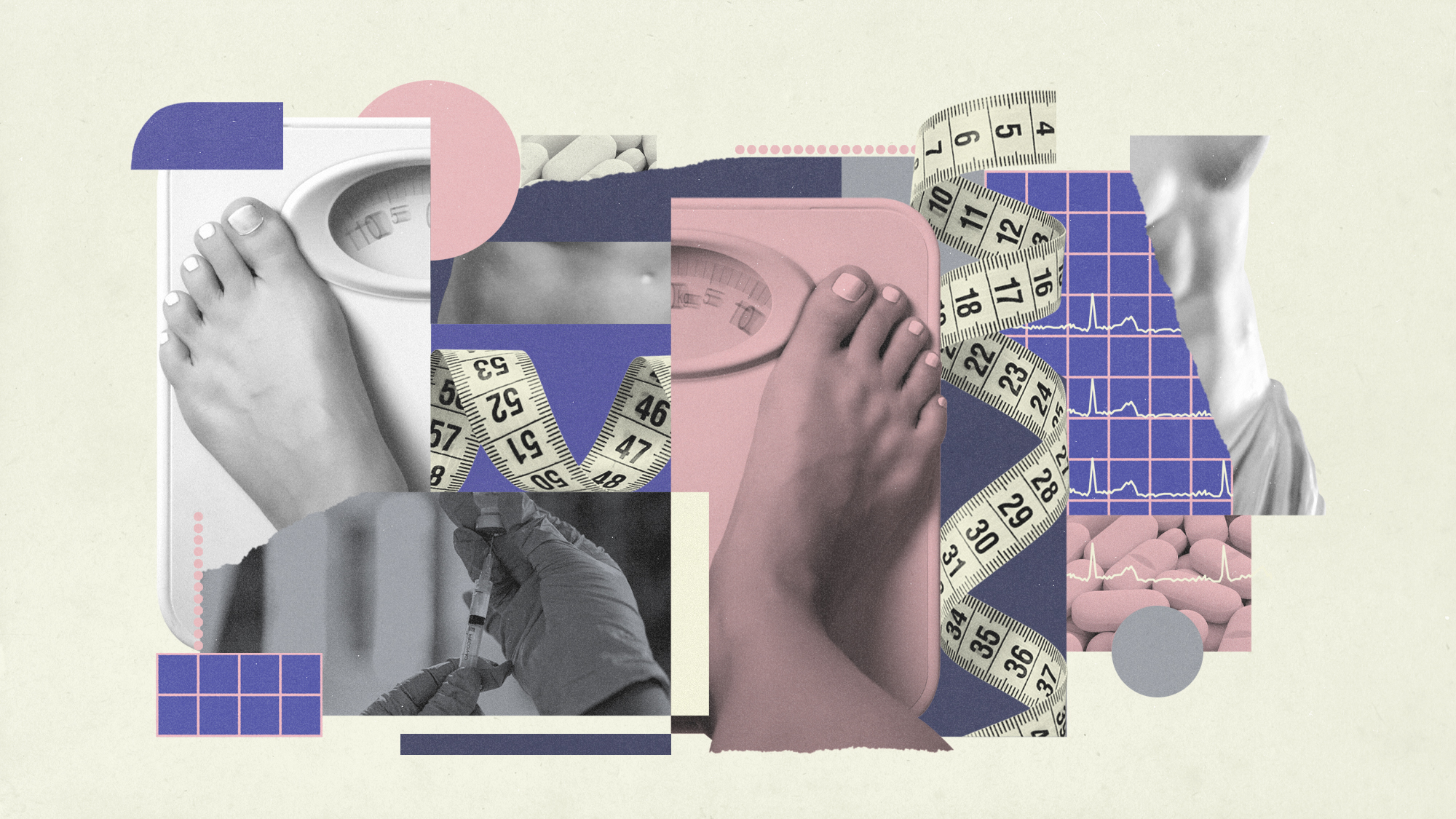Can Britain's £100bn obesity epidemic be reversed?
Weight-loss drugs hailed 'game-changer' as former food tsar calls for smoking-style restrictions on junk food

A free daily email with the biggest news stories of the day – and the best features from TheWeek.com
You are now subscribed
Your newsletter sign-up was successful
Britain's obesity epidemic is costing nearly £100 billion a year, according to a new analysis that has prompted calls for the government to introduce smoking-style restrictions on junk food.
Commissioned by the Tony Blair Institute and published in The Times, the analysis found that the effect on national productivity from excess weight was nine times bigger than previously thought.
Wider social costs include productivity losses of £15.1 billion, while obesity-related illness is estimated to cost the NHS £19.2 billion a year. Combined with the £63 billion cost of shorter, unhealthier lives, the total bill is £98 billion – equivalent to about 4% of GDP.
The Week
Escape your echo chamber. Get the facts behind the news, plus analysis from multiple perspectives.

Sign up for The Week's Free Newsletters
From our morning news briefing to a weekly Good News Newsletter, get the best of The Week delivered directly to your inbox.
From our morning news briefing to a weekly Good News Newsletter, get the best of The Week delivered directly to your inbox.
The government's former food tsar Henry Dimbleby, founder of the Leon food chain, said the related NHS costs that "will suck all the money out of the other public services", while "at the same time, economic growth and tax revenue will stagnate".
Without the right policies and a radial culture change to tackle the obesity crisis, "we will end up both a sick and impoverished nation", he was expected to add in a keynote speech today at a Royal Society conference.
What did the papers say?
Obesity, defined as having a body mass index equal to or greater than 30, is "one of the most serious public health crises around the world", said the Financial Times (FT), and the UK has one of the highest obesity rates in Europe. Two-thirds of British adults are now overweight or obese, up from half a generation ago, "with the biggest increase seen in the heaviest categories", added The Telegraph.
While there are multiple factors at play, health professionals point to drastic changes in diet over the past 50 years. Cheap, ultra-processed food now accounts for 57% of what Britons eat, according to a 2019 study conducted by researchers at the University of São Paulo. Analysis of family eating habits by the Department for Environment, Food & Rural Affairs revealed that the average consumption of takeaway chicken has increased by 613% from 1974; ready meals and convenience meat products by 549%; and crisps and potato snacks by 226%.
A free daily email with the biggest news stories of the day – and the best features from TheWeek.com
The affordability of processed foods is a "significant driver of these dietary patterns", said the FT, with the price disparity between ultra-processed foods and fruits and vegetables explaining "why obesity is more prominent among the most vulnerable households".
Unhealthy food is also heavily advertised. According to the Food Foundation, a third of advertising spend in the UK goes towards confectionery, snacks, desserts and soft drinks, compared with only 1% for fruit and vegetables.
The result is a ticking health and economic timebomb, with an estimated 350,000 people aged 50-64 out of work because of their weight, and the cost of obesity expected to grow by another £10 billion over the next 15 years as the nation's population ages.
The Telegraph reported that when Boris Johnson appears before the Covid inquiry this week, the former PM is expected to argue that Britain's obesity problem "made tackling coronavirus more difficult".
What next?
A Department of Health spokesperson insisted the government was "taking firm action to tackle obesity", citing food-labelling guidelines, funding for school sports and healthy food vouchers for disadvantaged families. But the latest figures have renewed calls for a more interventionist approach.
A levy on sugary soft drinks introduced in 2018 may have prevented more than 5,000 cases of obesity every year among girls in their final year of primary school, according to analysis from the University of Cambridge.
But the Conservative government has been reluctant to adopt more stringent anti-obesity measures, claiming the cost-of-living crisis makes this the wrong time to target the sale of cheap food. Plans to introduce a 9pm advertising watershed for junk foods and a ban on buy-one-get-one-free deals on unhealthy products have been pushed back to 2025.
Meanwhile, regulations on food promotion and placement in England's supermarkets introduced last year aimed at tackling childhood obesity are not being effectively enforced, according to the results of a new survey by Obesity Health Alliance (OHA) and Food Active, published in The Observer yesterday. The survey found that a quarter of stores visited put sweets, crisps, fizzy drinks or other so-called "less healthy" foods in prominent parts of the shop, such as close to checkouts or in end-of-aisle displays.
The arrival of the weight-loss jab Wegovy to the NHS last month, said the FT, has been heralded as a "game-changer" in the fight against obesity. Privately, ministers compare drugs that use hormones to suppress appetite to statins as "preventative medication that will ultimately be given to millions of people", reported The Times, with trials under way to see whether can "help people get off benefits and back to work".
But there is deep unease within the medical community over prescribing weight-loss drugs to a large proportion of the population without a proper understanding of the side-effects or long-term consequences.
Former food tsar Dimbleby was expected to argue this afternoon that there is still "time to take a different route".
"With the right policies, we can change culture," he was due to say, adding that "if we have social and political will", public spaces "awash in junk food" could "one day be seen as just as outdated as the smoke-filled rooms of the past".
-
 Switzerland could vote to cap its population
Switzerland could vote to cap its populationUnder the Radar Swiss People’s Party proposes referendum on radical anti-immigration measure to limit residents to 10 million
-
 Political cartoons for February 15
Political cartoons for February 15Cartoons Sunday's political cartoons include political ventriloquism, Europe in the middle, and more
-
 The broken water companies failing England and Wales
The broken water companies failing England and WalesExplainer With rising bills, deteriorating river health and a lack of investment, regulators face an uphill battle to stabilise the industry
-
 ‘Longevity fixation syndrome’: the allure of eternal youth
‘Longevity fixation syndrome’: the allure of eternal youthIn The Spotlight Obsession with beating biological clock identified as damaging new addiction
-
 Europe’s apples are peppered with toxic pesticides
Europe’s apples are peppered with toxic pesticidesUnder the Radar Campaign groups say existing EU regulations don’t account for risk of ‘cocktail effect’
-
 A real head scratcher: how scabies returned to the UK
A real head scratcher: how scabies returned to the UKThe Explainer The ‘Victorian-era’ condition is on the rise in the UK, and experts aren’t sure why
-
 Mixed nuts: RFK Jr.’s new nutrition guidelines receive uneven reviews
Mixed nuts: RFK Jr.’s new nutrition guidelines receive uneven reviewsTalking Points The guidelines emphasize red meat and full-fat dairy
-
 How dangerous is the ‘K’ strain super-flu?
How dangerous is the ‘K’ strain super-flu?The Explainer Surge in cases of new variant H3N2 flu in UK and around the world
-
 Choline: the ‘under-appreciated’ nutrient
Choline: the ‘under-appreciated’ nutrientThe Explainer Studies link choline levels to accelerated ageing, anxiety, memory function and more
-
 Obesity drugs: Will Trump’s plan lower costs?
Obesity drugs: Will Trump’s plan lower costs?Feature Even $149 a month, the advertised price for a starting dose of a still-in-development GLP-1 pill on TrumpRx, will be too big a burden for the many Americans ‘struggling to afford groceries’
-
 Ultra-processed America
Ultra-processed AmericaFeature Highly processed foods make up most of our diet. Is that so bad?